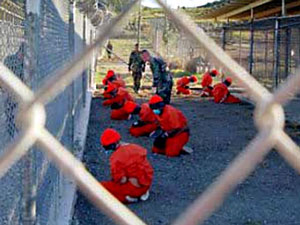/GIN

GENEVA (IPS/GIN) – What was already an open secret, detentions in secret prisons in the fight against terrorism since the Sept. 11, 2001 terror attacks in the U.S., has been clearly documented in a report on these abuses that was discussed by the United Nations Human Rights Council.
And despite the controversial nature of the report, debate on which was delayed since March, none of the countries at the meeting rejected it outright.
Although secret detentions are not new, and indeed had taken on the magnitude of a crime against humanity during the dictatorships in Latin America in the 1970s and 1980s, the practice expanded after 9/11, as part of the counterterrorism effort led by the United States.
Besides the secret detention centers, the counterterrorism methods used since 2001 include “extraordinary renditions”–the handing over of prisoners to countries where torture is allowed.
The report commissioned by the UN and drawn up by four independent experts describes in detail these illegal activities and the flights organized to transport terror suspects, with stopovers in a number of states that acted as accomplices.
The report “focuses attention on how much secret detention is a global problem, and a real problem today,” said Amnesty International’s representative at the UN in Geneva, Peter Splinter, told IPS.
The authors of the report are Martin Scheinin of Finland, UN special rapporteur on human rights and counter-terrorism; Manfred Nowak of Austria, UN special rapporteur on torture; Shaheen Ali of Pakistan, vice chair of the working group on arbitrary detention; and Jeremy Sarkin of South Africa, chair of the working group on enforced or involuntary disappearances.
The report says that many countries, citing concerns related to national security, “often perceived or presented as unprecedented emergencies or threats–resort to secret detention.”
“International law clearly prohibits secret detention, which violates a number of human rights and humanitarian law norms that may not be derogated under any circumstances,” says the report.
“Resorting to secret detention effectively means taking (detainees) outside the legal framework and rendering the safeguards contained in international instruments, most importantly habeas corpus, meaningless,” it adds.
The study’s recommendations included an explicit prohibition of secret detention, and the keeping of clear detention records, even at times of armed conflict, as stipulated by the Geneva Convention on the treatment of prisoners of war.
With regard to the Security Council’s discussion of the study, Mr. Scheinin noted some countries that originally opposed the report, like Egypt, “chose not to speak” at the June 3 meeting, while some “spoke in a tone which was stronger than others,” such as Syria, Russia, or Algeria, which was speaking on behalf of the African Group.
Yet other countries raised specific issues, like Ethiopia, China, Nepal or Canada, he added.
With respect to the United States, which figures repeatedly in the report–along with the Central Intelligence Agency–for its post-9/11 counterterrorism policies, Mr. Ali said that country’s ambassador to the Human Rights Council, Eileen Donahoe, backed the study although she raised concerns about the methodology used in preparing it.
Mr. Scheinin told IPS that the United States had failed to implement the decision reached by President Barack Obama soon after taking office in January 2009 to close the detention facility at the U.S. naval base in Guantánamo, Cuba.
“As a matter of international law, that of course means that they are continuing to violate their human rights obligations by not closing” the detention center and by not putting the persons held there on trial, he added.
The expert said, however, that “on the domestic level and on the policy level, I understand the situation. The government is unable to do anything when the legislature prohibits part of the options available: namely taking a single person from Guantanamo to the mainland United States.”
As a result, he pointed out, the pressure is on efforts to convince third countries to take in Guantanamo detainees.
The list of countries and territories mentioned by the UN study, in terms of different levels of involvement or complicity in secret detentions, renditions or facilitating rendition flights, is long.
The document mentions Thailand, Poland, Romania, Afghanistan, Czech Republic, Uzbekistan, Morocco, Lithuania, Kosovo, Bosnia and Herzegovina, Syria, Pakistan, Iraq, Jordan, Egypt, Ethiopia, Djibouti, the United Kingdom, Germany, Canada, Italy, and the former Yugoslav Republic of Macedonia.
“It’s not a problem, as some delegations seem to suggest, in just a few countries. It’s a problem involving many countries, and the complicity of many intelligence and police services,” said Mr. Splinter.












